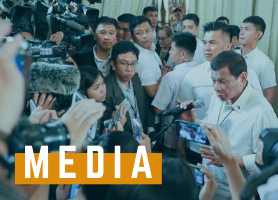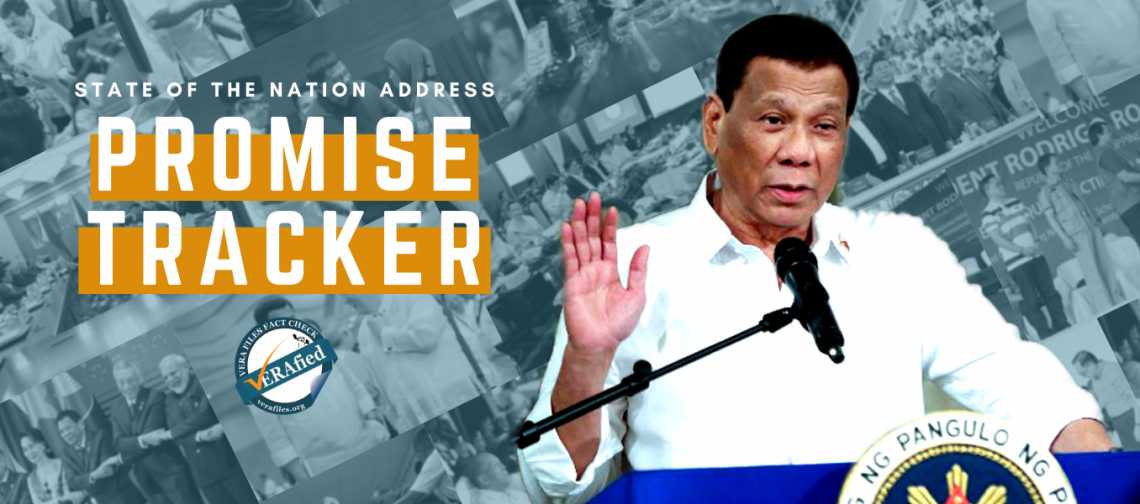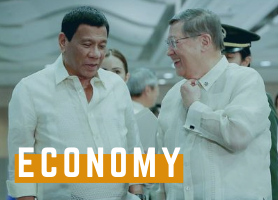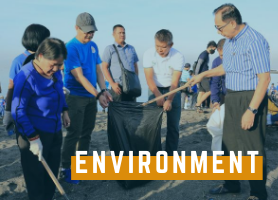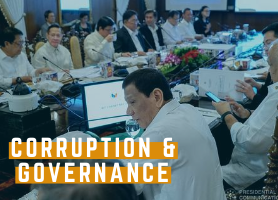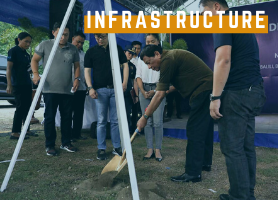More than halfway into his six-year term, President Rodrigo Duterte has neither made new promises nor followed through on previous ones related to the media since his 2016 state of the nation address. Yet there was no let-up in his clashes with, and tirades against the media.
This July, Duterte’s threat to block the franchise renewal of media giant ABS-CBN became a reality after the House committee on legislative franchises delivered the coup de grace, denying the network’s bid for a new 25-year franchise.
The president had accused ABS-CBN of bias, a sentiment echoed by his congressional allies during marathon hearings of the House panel.
ABS-CBN shut down operations of its free TV and radio channels after the National Telecommunications Commission filed its first cease-and-desist order on May 5, a day after the network’s 1995 franchise expired. (See VERA FILES FACT CHECK: NTC backpedals on ABS-CBN franchise)
The country’s largest broadcast network with more than 11,000 employees, has started massive layoffs.
The Philippines fell two notches in the Reporters Without Borders’ 2020 World Press Freedom Index, ranking 136th among 180 countries. This is the third consecutive dip in the press freedom index for the country once known to have the freest press in Asia. The Press Freedom index evaluates, among others, media independence, environment and self-censorship, legislative framework, transparency, and quality of infrastructure that supports news production.
In its report, the Reporters Without Borders cited the administration’s “grotesque judicial harassment campaign” against Rappler CEO Maria Ressa and “threats and intimidation” faced by ABS-CBN, among others.
Last June, Ressa and former Rappler researcher-writer Reynaldo Santos Jr. were found guilty of cyber-libel. The case stemmed from Santos’ May 2012 article on the late former chief justice Renato Corona’s links to businessman Wilfredo Keng, who filed the complaint. The Rappler story linked Keng to alleged illegal drugs and human trafficking operations.
The case tested the 8-year-old Philippine cybercrime law, which was enacted four months after the article was first published.
One of world’s worst countries for journalists
From Jan. 1, 2019 to April 30, 2020, the Center for Media Freedom and Responsibility (CMFR) and National Union of Journalists of the Philippines (NUJP) documented 61 reported incidents of threats and attacks against the press, including three journalists who were killed.
The Philippines remains one of the world’s worst countries when it comes to solving media killings, recently ranking fifth in the Committee to Protect Journalists’ (CPJ) 2019 Global Impunity Index.
The ranking was in part due to the 2009 Maguindanao massacre, where 58 individuals, including 32 journalists and media workers, were killed in the deadliest single attack against journalists in history. The trial was still ongoing during the publication of the CPJ report.
After over nine years of trial, sibling masterminds, Datu Andal “Unsay” Ampatuan Jr. and Zaldy Ampatuan, and 26 other accomplices were convicted in the December 2019 ruling promulgated by Quezon City Regional Trial Court Judge Jocelyn Solis-Reyes.
Presidential Task Force on Media Security Executive Director (PTFoMS) Joel Sy Egco said the country’s ranking was “expected,” but that next year’s index will improve following the court decision.
PTFoMS, in its accomplishment report from October 2016 to January 2020, regarded its count of 49 convictions for media violence during the Duterte administration a “world record.” Egco said the Ampatuan ruling should be considered “part of the Duterte Legacy.”
Despite local and international watchdogs’ reproach against state pressures on journalists critical of the administration, Communications Secretary Martin Andanar said the Duterte government has created an “enabling media environment” and “safe space for journalists.” “Press freedom is very much alive in the Philippines,” he added.
From his first SONA in 2016, here’s how the President fared in its media-related promises:
PROMISE: Create People’s Broadcasting Corporation (PBC)
|
|
“To better manage public information, a law should be passed, I’m addressing to Congress, to create the People’s Broadcasting Corporation, replacing PTV-4, the government-run TV station, which now aims to replicate international government broadcasting networks.” (SONA 2016) |
|
A bill creating the PBC has not been re-filed in the 18th Congress. Previous bills filed in the House of Representatives (HB 2143) and Senate (SB 913) failed to be passed in the 17th Congress. |
PROMISE: Foreign media training for government media
|
|
“Teams from these international news agencies – I’d like to mention that, those interested, BBC – are set to visit the country soon to train people from the government-run channels to observe – ito ang gusto ko, tutal pera naman ng tao – to observe editorial independence through innovative programs and intelligent treatment and analysis of news reports, as well as developments of national and international significance.” (SONA 2016)
|
|
In 2016, Andanar said PTV-4 was to “undergo a major revitalization program to make the station at par with International Broadcast Standards.” In line with this, teams from the British Broadcasting Company (BBC) and Australian Broadcasting Company (ABC) were set to visit to “train our broadcast people to observe editorial independence.” So far, no concrete arrangements on these trainings have been reported by Andanar or his office. PCOO has yet to respond to VERA Files’ query on the matter as of posting. In 2017, China and the Philippines signed a Memorandum of Understanding (MOU) to “strengthen cooperation between [their] news organizations.” Since then, journalists and government media workers participated in at least two broadcast training seminars in China in May 2018 and 2019. In 2018, Korea and the Philippines also entered into an MOU which aimed to “enhance the broadcast capabilities of both countries through joint or individual activities and programs that help strengthen cooperation.” In a Philippine News Agency report, Andanar said the government can now send its reporters, cameramen, production crew to South Korea “ para matutunan nila ang galing ng Koreano (to learn from the talents of Koreans).” In 2019, Communications Asst. Secretary JV Arcena said state-run media agencies would be partnering with Russian TV network RT, short for “Russia Today,” which offered training programs for state media practitioners “para sila rin ay makapaghasa o makapag-share ng kanilang mga best practices na iba naman kumpara sa mga western media (so that they can hone and share their best practices which are different from western media).” Arcena added, “ibang klase o ibang uri ng pamamahayag ang kanilang ituturo […] sa atin pong mga […] Filipino journalists (they are going to teach a different kind of journalism to Filipino journalists).” |
PROMISE: Set up broadcast hubs in Visayas and Mindanao
|
|
“The PBC will also set up broadcast hubs in the Visayas and Mindanao.” (SONA 2016) |
|
The Presidential Communications Operations Office (PCOO) launched the Mindanao Media Hub in May 2018 to serve as the government’s main broadcast hub for Regions 10 to 13, “delivering tailored content specific to its people and boosting signal in the areas of coverage.” The state-of-the-art facility in Davao was expected to be complete by the first quarter of 2019 and fully operational by the second or third of the same year. In Aug. 2019, Andanar said it was “more than 90 percent finished.” At the same time, the press secretary also introduced plans for a Visayas Media Hub in Cebu, to start construction in 2021. However, People’s Television Network, Inc. Head Executive Assistant Gerardo Ledonio III told VERA Files in a July 24 email that the project has yet to receive funding. He said the development is not included in the recommended National Expenditure Program of the Department of Budget and Management. The Mindanao Media Hub, which was supposed to be unveiled last June, was also put on hold due to the earthquake in Mindanao earlier this year and declaration of Enhanced Community Quarantine (ECQ) in light of the COVID-19 pandemic, Ledonio said. Barring any more setbacks, he said they are “hopeful” to inaugurate the hub before the end of 2020. |
PROMISE: First Muslim and Lumad channel
|
|
“Davao City will also be the first site of the first Muslim channel to be called Salaam Television and the first Lumad channel.” (SONA 2016)
|
|
Salaam TV and Lumad TV, the first government-run Muslim and Lumad channels in the Philippines respectively, were launched in July 2017. Both air via digital transmission, sharing a frequency owned by the People’s Television Network (PTV). An eponymous supplemental program of Salaam TV also airs weekly on PTV-4. |
Sources
Rappler, Duterte to block renewal of ABS-CBN franchise, April 27, 2017
Presidential Communications Operations Office, Speech of President Rodrigo Roa Duterte during the inauguration of Northern Mindanao Wellness and Reintegration Center, Aug. 3, 2018
RTVMalacanang, Oath-taking of the Newly Appointed Officials (Speech) 12/3/2019, Dec. 3, 2019
ABS-CBN News, READ: House panel’s Findings and Recommendations denying ABS-CBN a new franchise, July 10, 2020
ABS-CBN News, READ: ABS-CBN statement on layoff of workers, July 15, 2020
Reporters Without Borders, 2020 World Press Freedom Index, Accessed July 20, 2020
Reporters Without Borders, 2019 World Press Freedom Index, Accessed July 22, 2020
Reporters Without Borders, 2018 World Press Freedom Index, Accessed July 22, 2020
Reporters Without Borders, 2020 World Press Freedom Index – tipping point, Accessed July 22, 2020
Reporters Without Borders, Detailed methodology, Accessed July 22, 2020
Reporters Without Borders, Philippines, Accessed July 20, 2020
Center for Media Freedom and Responsibility, State of Media Freedom in PH, May 3, 2020
Committee to Protect Journalists, Getting Away with Murder: Global Impunity Index 2019, Oct. 29, 2019
Presidential Communications Operations Office, Press Briefing of Presidential Spokesperson and Chief Presidential Legal Counsel Secretary Salvador Panelo with Presidential Task Force on Media Security (PTFOMS) Executive Director Undersecretary Joel Sy Egco, Oct. 30, 2018
Presidential Task Force on Media Security, PTFoMS 2020 Reinforced, Reloaded, Jan. 2020
Philippine News Agency, Press freedom ‘very much alive’ in PH: Andanar, Feb. 26, 2020
On People’s Broadcasting Corporation
- Senate of the Philippines, Senate Bill 913, Aug. 16, 2016
- House of Representatives of the Philippines, House Bill 2143, July 28, 2016
On foreign media training
- INQUIRER.net, Andanar: BBC, ABC to visit PH for PTV 4 transformation, July 7, 2016
- Presidential Communications Operations Office, PTV hits the ground running, July 22, 2016
- Presidential Communications Operations Office, PH, China ink agreements for further bilateral cooperation, May 17, 2017
- Philippine News Agency, Andanar sends off 21 journalists, info officers to China, May 16, 2018
- Philippine News Agency, PH journos take part in China’s seminar for media practitioners, May 18, 2019
- Philippine Information Agency, PH Media, Info Officers undergo Broadcast Training in China, May 21, 2019
- Philippine News Agency, Gov’t media gets further boost from PH-SoKor MOU, June 5, 2018
- Presidential Communications Operations Office, Cabinet Report sa Teleradyo with Presidential Communications Operations Office Secretary Martin Andanar, PCOO Assistsant [sic] Secretary JV Arcena, and PCOO Assistant Secretary Kris Ablan by Weng Hidalgo, Radyo Pilipinas, Oct. 12, 2019
On Visayas, Mindanao broadcast hubs
- Presidential Communications Operations Office, PCOO launches Mindanao media hub, May 3, 2018
- Philippine News Agency, New hub, training center leap forward in state media: Andanar, Aug. 16, 2019
- Philippine News Agency, Sec. Andanar highlights Duterte Legacy program, Feb. 4, 2020
- Philippine Information Agency, PCOO chief eyes Visayas media hub in Cebu, Aug. 23, 2019
On Muslim, Lumad channels
- PTV News, PH’s Salaam TV to give Filipino Muslims a voice, July 8, 2017
- Manila Bulletin, PTV4 to the fore, July 18, 2018
- Salaam TV, About, Accessed July 15, 2020
- Lumad TV, About, Accessed July 15, 2020
(Guided by the code of principles of the International Fact-Checking Network at Poynter, VERA Files tracks the false claims, flip-flops, misleading statements of public officials and figures, and debunks them with factual evidence. Find out more about this initiative and our methodology.)
